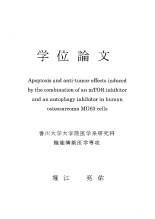Apoptosis and antitumor effects induced by the combination of an mTOR inhibitor and an autophagy inhibitor in human osteosarcoma MG63 cells
この論文にアクセスする
著者
書誌事項
- タイトル
-
Apoptosis and antitumor effects induced by the combination of an mTOR inhibitor and an autophagy inhibitor in human osteosarcoma MG63 cells
- 著者名
-
堀江, 亮佑
- 学位授与大学
-
香川大学
- 取得学位
-
博士(医学)
- 学位授与番号
-
甲第623号
- 学位授与年月日
-
2016-03-24
注記・抄録
AbstractThe inhibition of the mammalian target of rapamycin (mTOR) signaling pathway promotes the initiation of autophagy. Although it remains under debate whether chemotherapy-induced autophagy in tumor cells is a protective response or is invoked to promote cell death, recent studies indicate that autophagy is a self-defense mechanism of cancer cells that are subjected to antitumor agents and that blocking autophagy can trigger apoptosis. The aim of this study was to examine the effects of rapamycin, an mTOR inhibitor, on MG63 osteosarcoma cells. We further examined whether the combination of rapamycin and the small molecule inhibitor of autophagy Spautin-1 (specific and potent autophagy inhibitor-1) enhanced the rapamycin-induced apoptosis in MG63 cells. We examined the effects of rapamycin treatment on cell proliferation, phosphorylation of mTOR pathway components, and autophagy by western blot analysis. Furthermore, we examined the effects of rapamycin with or without Spautin-1 on the induction of apoptosis by western blot analysis and immunohistochemical staining. We found that rapamycin inhibited cell proliferation and decreased the phosphorylation of mTOR pathway components in MG63 cells. Rapamycin induced the apoptosis of MG63 cells, and this apoptosis was enhanced by Spautin-1. It was considered that Spautin-1 suppressed the protective mechanism induced by rapamycin in tumor cells and induced apoptosis. Therefore, the combination of an mTOR inhibitor and an autophagy inhibitor may be effective in the treatment of osteosarcoma because it effectively induces the apoptotic pathway.
Abstract The inhibition of the mammalian target of rapamycin (mTOR) signaling pathway promotes the initiation of autophagy. Although it remains under debate whether chemotherapy-induced autophagy in tumor cells is a protective response or is invoked to promote cell death, recent studies indicate that autophagy is a self-defense mechanism of cancer cells that are subjected to antitumor agents and that blocking autophagy can trigger apoptosis. The aim of this study was to examine the effects of rapamycin, an mTOR inhibitor, on MG63 osteosarcoma cells. We further examined whether the combination of rapamycin and the small molecule inhibitor of autophagy Spautin-1 (specific and potent autophagy inhibitor-1) enhanced the rapamycin-induced apoptosis in MG63 cells. We examined the effects of rapamycin treatment on cell proliferation, phosphorylation of mTOR pathway components, and autophagy by western blot analysis. Furthermore, we examined the effects of rapamycin with or without Spautin-1 on the induction of apoptosis by western blot analysis and immunohistochemical staining. We found that rapamycin inhibited cell proliferation and decreased the phosphorylation of mTOR pathway components in MG63 cells. Rapamycin induced the apoptosis of MG63 cells, and this apoptosis was enhanced by Spautin-1. It was considered that Spautin-1 suppressed the protective mechanism induced by rapamycin in tumor cells and induced apoptosis. Therefore, the combination of an mTOR inhibitor and an autophagy inhibitor may be effective in the treatment of osteosarcoma because it effectively induces the apoptotic pathway.


